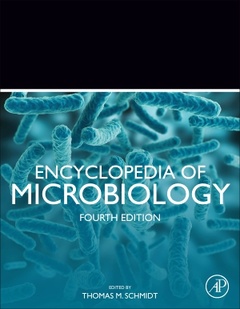Description
Encyclopedia of Microbiology (4th Ed.)
Coordinator: Schmidt Thomas M.
Language: English
Subject for Encyclopedia of Microbiology:
Keywords
Microbe; Symbiosis; Bacteria; Pathogen; Microbiome; Synthetic Biology; Molecular Biology; Archaea; Fungi; Virus
3496 p. · 21.6x27.6 cm · Hardback
Description
/li>Contents
/li>Readership
/li>Biography
/li>
Encyclopedia of Microbiology, Fourth Edition gathers both basic and applied dimensions in this dynamic field that includes virtually all environments on Earth. This range attracts a growing number of cross-disciplinary studies, which the encyclopedia makes available to readers from diverse educational backgrounds. The new edition builds on the solid foundation established in earlier versions, adding new material that reflects recent advances in the field. New focus areas include `Animal and Plant Microbiomes? and ?Global Impact of Microbes`. The thematic organization of the work allows users to focus on specific areas, e.g., for didactical purposes, while also browsing for topics in different areas.
- Offers an up-to-date and authoritative resource that covers the entire field of microbiology, from basic principles, to applied technologies
- Provides an organic overview that is useful to academic teachers and scientists from different backgrounds
- Includes chapters that are enriched with figures and graphs, and that can be easily consulted in isolation to find fundamental definitions and concepts
Pathogenesis and Immunology Microbial Genetics and Physiology Ecology and Evolution of Microbes Microbial Diversity Technological Advances and Applied Microbiology
University and corporate sector libraries serving students and scientists in microbiology, biomolecular and evolutionary biology, immunology and ecology. Secondary users include local and federal agencies e.g. decision makers in biotechnology, public health and environmental science.
He is full Professor in the Departments of Internal Medicine, Microbiology and Immunology at the University of Michigan; committee member at the American Academy for Microbiology and American Society for Microbiology; editorial board member for a number of journals, including Annual Reviews of Microbiology, and was Section Editor on the 3rd edition of Encyclopedia of Microbiology.

